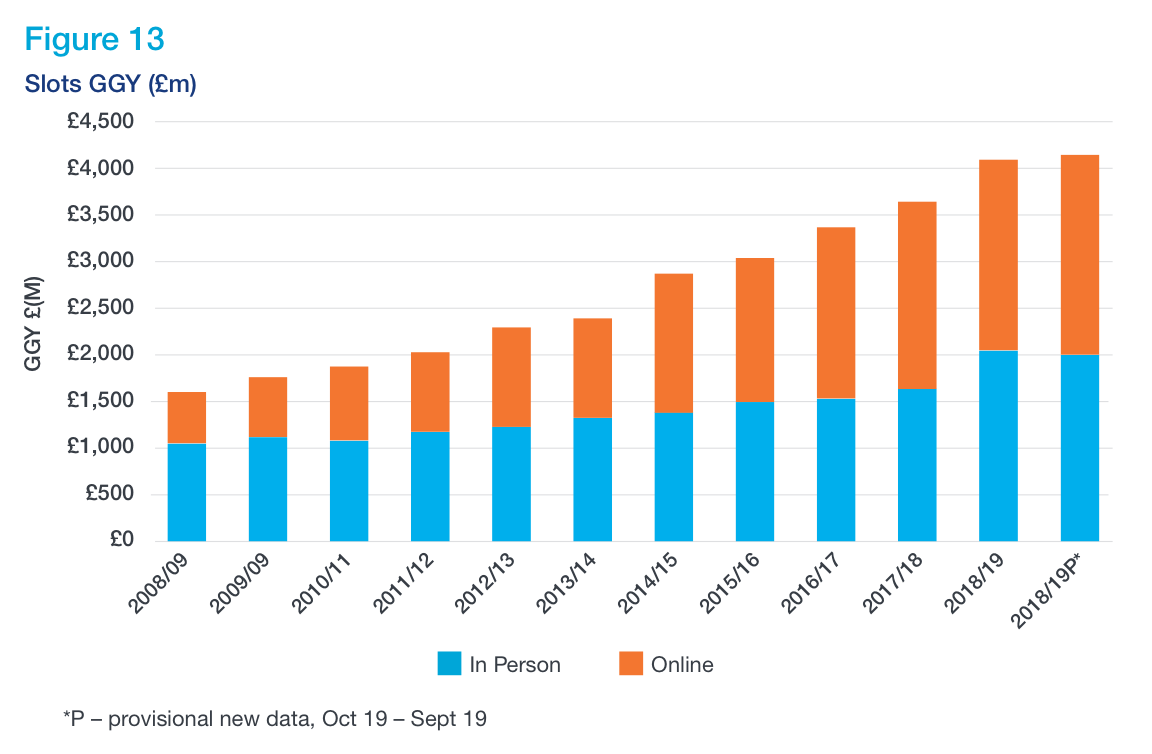Strategy
National Strategic Assessment 2020
This report sets out our latest assessment of the issues we face and the risks that gambling poses to consumers and the public
What do we know?
There has been an increase in the proportion of players who play slot games either online or in person. Online slots are the largest online gambling product by Gross Gambling Yield34 .
With an increasing proportion of players playing these higher risk products an area of focus is ensuring games are safer by design and consumers understand how they operate to enable them to make an informed choice.

The Gambling Commission knows that problem gambling rates associated with online slots, casino or bingo games are higher than the land-based equivalents. We have therefore focused on the drivers behind these products and how they can be made safer for consumers.
We also know the success of content creators and games designers depends on their ability to establish and maintain the engagement of their consumers. We know that this can be done by behavioural techniques which has the potential to unconsciously change consumer behaviour.
GC action
We will publish the findings of the randomised controlled trials with three large operators into anchoring and commitment devices.
There are many contributing factors the risks associated with a gambling product, including the speed and frequency of play, ease of access and scope to deposit and lose funds as a result of the design of games and the platforms they are made available from.
Gambling-related harm occurs at all levels of staking and across different gambling products. Rates of problem gambling across different gambling products should inform how licensees identify and mitigate the risks associated with their product range.
No single policy change can make gambling products safe. Addressing the risks associated with the products people play - such as stake limits or speed of play - should be considered alongside a package of complementary initiatives which impact each stage of a customer’s interaction with a given product. That is why our approach includes looking at affordability measures, better identification of vulnerability, earlier preventative action, safer game design, responsible marketing and advertising, and customer interaction.
To date, stake and prize limits have not been imposed on online gambling in Great Britain. They have been a longstanding feature of gaming machine regulation and are set by the Government. The majority of gaming machine play remains anonymous making personalised gambling management tools less effective.
Conversely, the potential for effective player- centric consumer protection that account- based play offers online licensees has not been sufficiently seized.
The following table provides a snapshot of the levels at which players staked when playing online slot games. It is important to note this data has been collected from licensees during the coronavirus (COVID-19) period where consumer behaviour has been impacted by factors including the closure of gambling premises. This analysis builds on an earlier snapshot of staking behaviour from January 201735.
| Online slots staking levels | April to August 2020 |
|---|---|
| £1 and below | 88% |
| £1.01 to £2 | 8% |
| £2.01 to £5 | 3% |
| £5.01 to £10 | 1% |
| £10.01 to £20 | 0.2% |
| £20.01 to £50 | 0.1% |
| £50.01 to £100 | 0.01% |
| >£100 | 0.004% |
Parity in consumer protection between online games and games played in premises would require the implementation of stake and prize-controls for online games and a requirement for account-based play on gaming machines.
To help inform consumers about how products operate there needs to be better communication of key gambling concepts to help consumers to understand their chances of winning. Research has found that consumers often struggle to understand ‘industry jargon’ and associated mathematical concepts and this is also apparent in customer complaint data36.
Research commissioned by Gamble Aware considered several options for better communicating concepts such as house edge, return to player and game volatility to players. But we have not seen licensee make sufficient progress in this key area to ensure gambling is as fair and open as possible.
GC action
To improve understanding of player experience of gambling products, we are actively engaged in several research programmes including the large scale GambleAware-funded project into online patterns of play being led by NatCen.
References
Key issues and risks Next section
What are the issues - Online game and platform design
Last updated: 25 July 2024
Show updates to this content
Following an audit corrected link formatting issues only.
